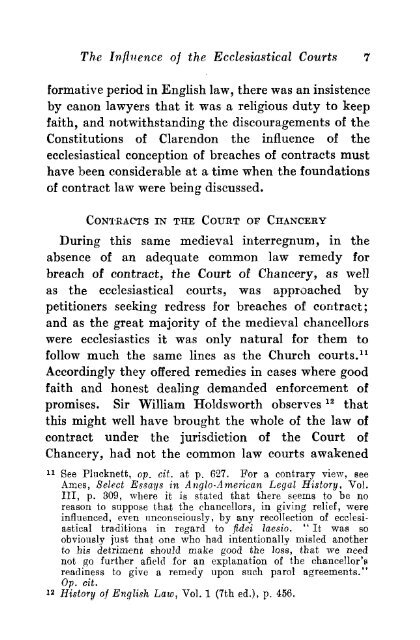The Sanctity of Contracts in English Law - College of Social ...
The Sanctity of Contracts in English Law - College of Social ...
The Sanctity of Contracts in English Law - College of Social ...
- No tags were found...
You also want an ePaper? Increase the reach of your titles
YUMPU automatically turns print PDFs into web optimized ePapers that Google loves.
<strong>The</strong> Influence <strong>of</strong> the Ecclesiastical Courts 7formative period <strong>in</strong> <strong>English</strong> law, there was an <strong>in</strong>sistenceby canon lawyers that it was a religious duty to keepfaith, and notwithstand<strong>in</strong>g the discouragements <strong>of</strong> theConstitutions <strong>of</strong> Clarendon the <strong>in</strong>fluence <strong>of</strong> theecclesiastical conception <strong>of</strong> breaches <strong>of</strong> contracts musthave been considerable at a time when the foundations<strong>of</strong> contract law were be<strong>in</strong>g discussed.CONTKACTS IN THE COURT OF CHANCERYDur<strong>in</strong>g this same medieval <strong>in</strong>terregnum, <strong>in</strong> theabsence <strong>of</strong> an adequate common law remedy forbreach <strong>of</strong> contract, the Court <strong>of</strong> Chancery, as wellas the ecclesiastical courts, was approached bypetitioners seek<strong>in</strong>g redress for breaches <strong>of</strong> contract;and as the great majority <strong>of</strong> the medieval chancellorswere ecclesiastics it was only natural for them t<strong>of</strong>ollow much the same l<strong>in</strong>es as the Church courts. 11Accord<strong>in</strong>gly they <strong>of</strong>fered remedies <strong>in</strong> cases where goodfaith and honest deal<strong>in</strong>g demanded enforcement <strong>of</strong>promises. Sir William Holdsworth observes 12 thatthis might well have brought the whole <strong>of</strong> the law <strong>of</strong>contract under the jurisdiction <strong>of</strong> the Court <strong>of</strong>Chancery, had not the common law courts awakened11 See Plnoknett, op. cit. at p. 627. For a contrary view, seeAmes, Select Essays <strong>in</strong> Anglo-American Legal History, Vol.Ill, p. 309, where it is stated that there seema to be noreason to suppose that the chancellors, <strong>in</strong> giv<strong>in</strong>g relief, were<strong>in</strong>fluenced, even unconsciously, by any recollection <strong>of</strong> ecclesiasticaltraditions <strong>in</strong> regard to fidei laesio. " It was soobviously just that one who had <strong>in</strong>tentionally misled anotherto his detriment should make good the loss, that we neednot go further afield for an explanation <strong>of</strong> the chancellor'sread<strong>in</strong>ess to give a remedy upon such parol agreements."Op. cit.12 History <strong>of</strong> <strong>English</strong> <strong>Law</strong>, Vol. 1 (7th ed.), p. 456.
















